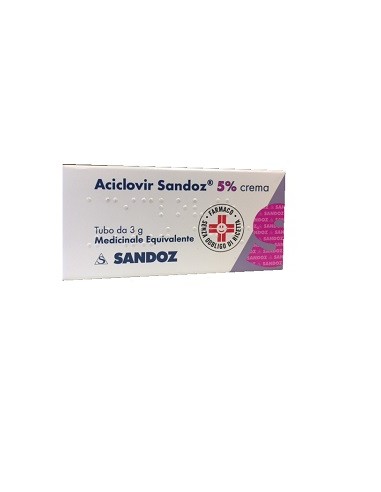Your cart
There are no more items in your cart
Over-the-counter drugs Aciclovir sand cream 3g 5% Sandoz
 100% secure payments
100% secure payments





ACICLOVIR SANDOZ 5% CREMA
active ingredients
100 g cream contain: Active ingredient: aciclovir 5,00 g.Excellent
Purified water; propylene glycol; labrafil; vaseline oil; polassamer 407; sodium lauril sulphate; tephus.Therapeutic indications
The product in cream formulation is indicated in the treatment of skin infections from Herpes simplex such as: Herpes genitalis primary or recurrent and Herpes labialis.Contraindications
Hypersensitivity known to aciclovir, valaciclovir, propylene glycol, to other formulation components. Generally contraindicated in pregnancy and nursing (see paragraph 4.6).Population
The cream must be applied 5 times a day at intervals of about 4 hours on injuries or areas where they are developing as early as possible after the beginning of the infection. It is particularly important to begin the treatment of recurring episodes during the prodromi stage or the first appearance of injuries. The treatment must continue for at least 5 days and up to a maximum of 10 if you did not have healing.Conservation
Store at a temperature not exceeding 25°C.Warnings
It is recommended not to apply aciclovir cream on mucous membranes (such as eyes, mouth or vagina), since it can be irritating. It is necessary to pay particular attention to avoid accidental introduction into the eye. Studies on the animal indicate that the application of Aciclovir in the formulation in vagina cream can cause reversible irritation. In severely immunocompromised patients (e.g. AIDS patients or who have received a bone marrow transplant) an oral aciclovir should be taken. Such patients should be encouraged to consult a doctor about the treatment of any infection. Propylene glycol excipient may cause skin irritations. The prolonged use of the product may result in awareness-raising phenomena, where this happens, it is necessary to stop the treatment and consult the doctor. Keep away from the reach and sight of children.Interactions
The probenecid increases the average half-life and the area below the plasma concentration curve of the Aciclovir administered systemically. The clinical experience has not revealed interactions with other drugs.Effects
The following convention was used for the classification of side effects in frequency terms: very common ≥1/10; common from ≥1/100 to Pathologies of the skin and subcutaneous tissue Not common: urticant transient sensation or burning following the application of cream aciclovir, slight drying or dequamation of the skin, itching. Rare: erythema. contact dermatitis after application. Where sensitivity tests have been conducted, reactive substances have proven to be more often the components of the cream, rather than aciclovir. Immune system disorders Very rare: immediate reactions of hypersensitivity, including angioedema and hives.Overdosing
There is no undesirable effect even if the entire content of an aciclovir cream tube (500 mg) is taken orally, since single doses of 600 mg and daily doses of up to 3600 mg have been administered orally without side effects. Individual intravenous doses of up to 80 mg/kg have been administered accidentally without side effects. Aciclovir is dialysis.Pregnancy
During this period the drug must be used only in cases of absolute necessity under the direct control of the doctor. A register of post-marketing pregnancy for aciclovir has documented the effects on pregnancy in women exposed to any formulation of aciclovir. The results showed no increase in the number of birth malformations among individuals exposed to aciclovir compared to the general population and any birth defects showed no unique features or recurring patterns that could suggest a common cause. Systemic administration of aciclovir in the course of internationally recognized standard tests has not produced any embryotoxic or teratogenic effects in rabbits, rats or mice. During a non-standard test carried out in the rat, fetal abnormalities were observed, but only after the administration of subcutaneous doses so high as to cause maternal toxicity. The clinical relevance of these results is uncertain. The use of aciclovir should be considered only if potential benefits exceed the possibility of unknown risks; systemic exposure to aciclovir due to the topical application of aciclovir cream is however very limited.Food
Some limited human data have shown that, following systemic administration, the drug passes into breast milk. However the dosage received by a milker after the use of aciclovir cream by the mother is insignificant. We recommend caution in the use of aciclovir during breastfeeding.Source: Farmadati
- Deductible product
- Yes
033731047
82 Items
New
No reviews

